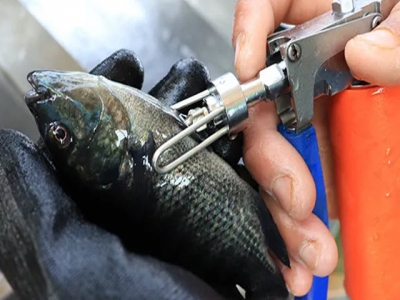Vaccines provide tilapia producers with a platform for sustainable growth
Brazilian aquaculture has experienced significant growth in recent decades, particularly in its tilapia industry, which has been built on both cage
 Diseases of the Australian Freshwater Fish Silver Perch (Bidyanus bidyanus) - Part 9
Diseases of the Australian Freshwater Fish Silver Perch (Bidyanus bidyanus) - Part 9 Poor feeding practices such as overfeeding, underfeeding, feeding incorrect pellet sizes, the use of unsuitable or unpalatable diets and the feeding
 Diseases of the Australian Freshwater Fish Silver Perch (Bidyanus bidyanus) - Part 8
Diseases of the Australian Freshwater Fish Silver Perch (Bidyanus bidyanus) - Part 8 Noxious phytoplankton has been implicated in fish kills worldwide with the majority of problems occurring in marine systems.
 Diseases of the Australian Freshwater Fish Silver Perch (Bidyanus bidyanus) - Part 7
Diseases of the Australian Freshwater Fish Silver Perch (Bidyanus bidyanus) - Part 7 Viruses are extremely small agents comprised of DNA or RNA surrounded by protein. Viruses must invade living cells in other organisms to replicate.
 Diseases of the Australian Freshwater Fish Silver Perch (Bidyanus bidyanus) - Part 6
Diseases of the Australian Freshwater Fish Silver Perch (Bidyanus bidyanus) - Part 6 The bacterium, Streptococcus iniae, causes streptococcosis in silver perch. The disease has been rarely reported, although losses in the few outbreaks were sign
 Diseases of the Australian Freshwater Fish Silver Perch (Bidyanus bidyanus) - Part 5
Diseases of the Australian Freshwater Fish Silver Perch (Bidyanus bidyanus) - Part 5 The aquatic fungus, Aphanomyces invadans, causes EUS on silver perch farms located in coastal regions in northeastern NSW and southeastern Queensland
 Diseases of the Australian Freshwater Fish Silver Perch (Bidyanus bidyanus) - Part 4
Diseases of the Australian Freshwater Fish Silver Perch (Bidyanus bidyanus) - Part 4 Diseases of the Australian Freshwater Fish Silver Perch (Bidyanus bidyanus) - Part 4
 Diseases of the Australian Freshwater Fish Silver Perch (Bidyanus bidyanus) - Part 3
Diseases of the Australian Freshwater Fish Silver Perch (Bidyanus bidyanus) - Part 3 Diseases of the Australian Freshwater Fish Silver Perch (Bidyanus bidyanus) - Part 3
 Diseases of the Australian Freshwater Fish Silver Perch (Bidyanus bidyanus) - Part 2
Diseases of the Australian Freshwater Fish Silver Perch (Bidyanus bidyanus) - Part 2 Diseases of the Australian Freshwater Fish Silver Perch (Bidyanus bidyanus) - Part 2
 Diseases of the Australian Freshwater Fish Silver Perch (Bidyanus bidyanus) - Part 1
Diseases of the Australian Freshwater Fish Silver Perch (Bidyanus bidyanus) - Part 1 Diseases of the Australian Freshwater Fish Silver Perch (Bidyanus bidyanus) - Part 1
 Food fit for a king (salmon)
Food fit for a king (salmon) After seven years of research and development, a selection of advanced diets tailor-made for king salmon has finally been produced.
 Improving the performance of cleaner fish in salmon aquaculture
Improving the performance of cleaner fish in salmon aquaculture A new project aims to produce ballan wrasse that are more effective at eating sea lice on salmon farms.
 Barramundi breeders aim to strike gold
Barramundi breeders aim to strike gold Plans to create a pure breeding line of the rare and highly prized gold barramundi have been revealed by scientists at James Cook University (JCU).
 Realising the unmet potential of farming tilapia in saltwater
Realising the unmet potential of farming tilapia in saltwater Producing tilapia in marine environments offers a number of advantages over traditional freshwater farming of these fish – saltwater
 The pros and cons of tagging farmed fish
The pros and cons of tagging farmed fish The use of tags to monitor the behaviour of farmed fish can provide scientists with important information, but also create welfare issues, according to a new st
 Specialist lighting increases tilapia growth rates by 10 percent
Specialist lighting increases tilapia growth rates by 10 percent Trials of a specialist lighting system have led to a 10 percent increase in tilapia growth rates and a 10 percent reduction in their feed conversion ratio (FCR)
 Feed ingredients and feeds for channel catfish - Part 2
Feed ingredients and feeds for channel catfish - Part 2 Commercial catfish feeds are supplemented with a vitamin premix that provides all vitamins in quantities necessary to meet requirements
 Feed ingredients and feeds for channel catfish - Part 1
Feed ingredients and feeds for channel catfish - Part 1 This factsheet by the Southern Regional Aquaculture Center (SRAC) gives information on what feeds and feed ingredients should be used for channel catfish.
 High hopes for an oral Francisella vaccine for tilapia
High hopes for an oral Francisella vaccine for tilapia Researchers are optimistic about the possibility of developing an oral vaccine against francisellosis in tilapia, following promising trials in Thailand.
 Why stress causes smaller tilapia to spawn
Why stress causes smaller tilapia to spawn Tilapia living in crowded aquaculture ponds or small freshwater reservoirs adapt so well to these stressful environments that they stop growing and reproduce
